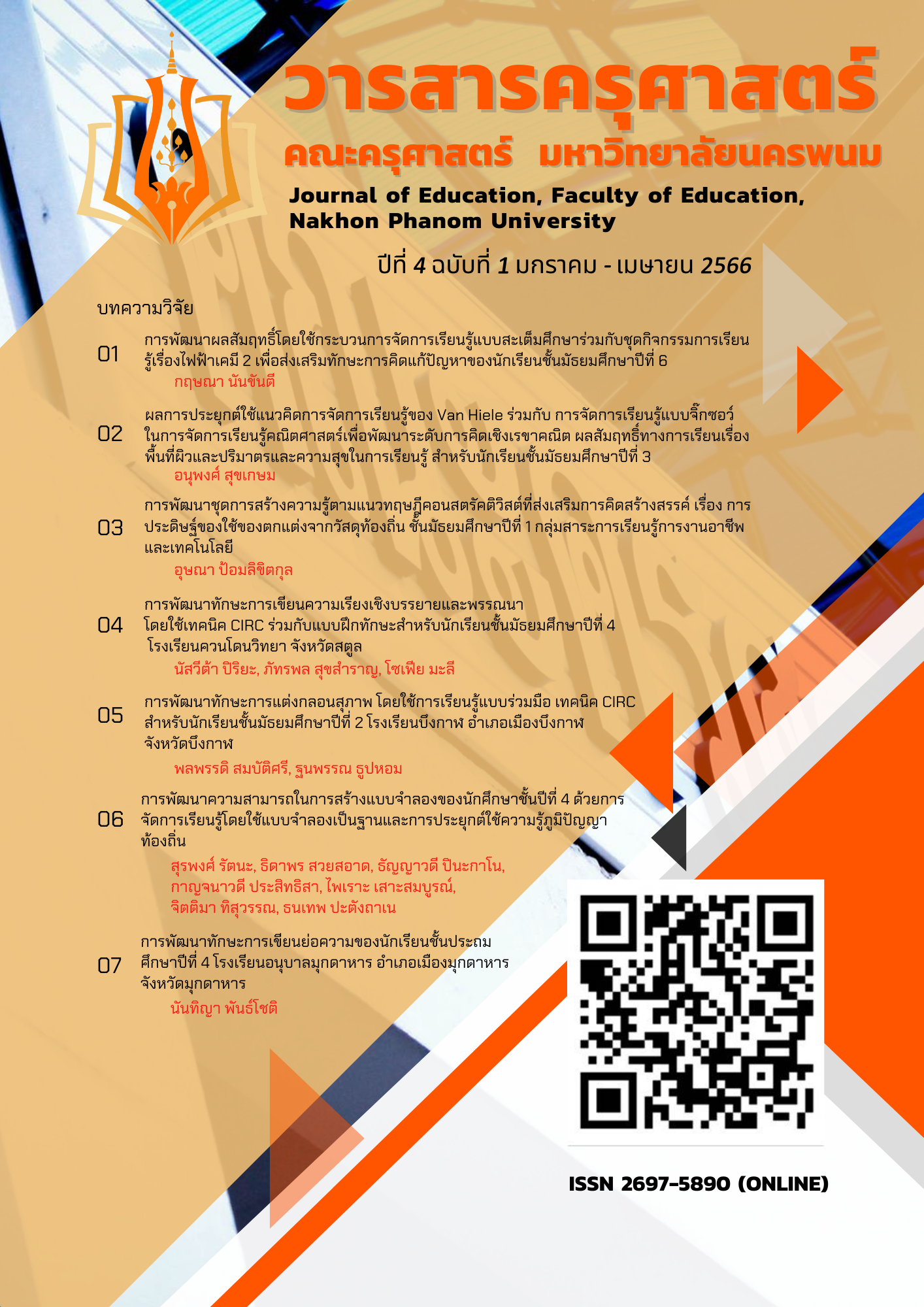Journal of Education, Faculty of Education, Nakhon Phanom University Development of Modeling Ability of Year 4 Undergraduate Students Using Model-Based Learning and Knowledge Application with Local Wisdom
Main Article Content
Abstract
The purpose of this research was to develop modeling ability on the force topic of fourth year undergraduate students by organizing model-based learning activities and applying knowledge of local wisdom. This research is action research. The target group of this research was 4th year students in Science Program, Faculty of Education, Nakhon Phanom University. The second semester of the academic year 2021 in local science subjects, there were 38 students, 12 males and 26 females. There were 2 types of research tools: 1) 6 science learning management plans on force topic, 2) a modeling capability assessment form. There are 4 components: modeling, using a model, model evaluation and model improvements. There are 2 cycles of practice, 3 learning management plan for each cycle.
The results showed that students have increased modeling abilities. The overall modeling ability in the 1st circle was 73.75%, in the 2nd cycle, the overall modeling ability. Accounting for 87.00 percent. The model-based learning management and the application of local wisdom knowledge were used to develop the students' modeling ability and Model-based learning can be applied in the teaching of force topic.
Article Details

This work is licensed under a Creative Commons Attribution-NonCommercial-NoDerivatives 4.0 International License.
บทความที่ได้รับการตีพิมพ์เป็นลิขสิทธิ์ของวารสารครุศาสตร์ คณะครุศาสตร์ มหาวิทยาลัยนครพนม ข้อความที่ปรากฏในบทความแต่ละเรื่องในวารสารครุศาสตร์เล่มนี้เป็นความคิดเห็นส่วนตัวของผู้เขียนแต่ละท่านไม่เกี่ยวข้องกับมหาวิทยาลัยนครพนม และคณาจารย์ท่านอื่น ๆ ในมหาวิทยาลัยฯ แต่อย่างใด ความรับผิดชอบองค์ประกอบทั้งหมดของบทความแต่ละเรื่องเป็นของผู้เขียนแต่ละท่าน หากมีความผิดพลาดใด ๆ ผู้เขียนแต่ละท่านจะรับผิดชอบบทความของตนเองแต่ผู้เดียว
References
ณัฐพล กวดไทย และสุมาลี ชูกำแพง. (2563). การพัฒนาความสามารถในการสร้าง แบบจำลองของนักเรียนชั้นมัธยมศึกษาปีที่ 4 รายวิชาชีววิทยา ด้วยการจัดการเรียนรู้ โดยใช้แบบจำลองเป็นฐาน. วารสารวิชาการมหาวิทยาลัยราชภัฏศรีสะเกษ, 14(2), น.63-71.
ธีรตา ชาติวรรณ, ธิติยา บงกชเพชร และอนุสรณ์ วรสิงห์. (2560). การจัดการเรียนรู้โดยใช้ แบบจำลอง เป็นฐานร่วมกับเทคโนโลยีเสมือนจริงเพื่อพัฒนาแบบจำลองทางความคิดของนักเรียนชั้น มัธยมศึกษาปีที่ 4 เรื่อง พันธะโควาเลนต์. วารสารมนุษยศาสตร์และสังคมศาสตร์, 13(1), น.266–281.
ปวีนา งามชัด และไพโรจน์ เติมเตชาติพงศ์. (2557) การเปลี่ยนแปลงมโนมติทางวิทยาศาสตร์และความสัมพันธ์ระหว่างการเห็นคุณค่าในตนเองกับการเปลี่ยนแปลงมโนมติเรื่อง การสืบพันธุ์ของพืชดอกของนักเรียนชั้นมัธยมศึกษาปีที่ 5 เมื่อใช้ยุทธศาสตร์ การสอนเพื่อเปลี่ยนมโนมติ. วารสารศึกษาศาสตร์ ฉบับวิจัยบัณฑิตศึกษา,
(1), น.164–171.
พรรณนภา อนิวรรตนวงศ์ และร่มเกล้า จันทราษี. (2562). การประเมินผลของการสืบเสาะหาความรู้โดยใช้แบบจำลองเป็นฐานร่วมกับการใช้การเชื่อมโยงหลักฐานและแบบจำลองที่มีต่อการอธิบายทางวิทยาศาสตร์ เรื่องสารละลายอิเล็กโทรไลต์และนอนอิเล็กโทรไลต์ของนักเรียนชั้นมัธยมศึกษาปีที่ 5. วารสารนวัตกรรมการเรียนรู้, 5(1), 65-83.
ภรทิพย์ สุภัทรชัยวงศ์ ชาตรี ฝ่ายคำตา และพจนารถ สุวรรณรุจิ. (2558). การจัดการเรียนรู้ โดยใช้แบบจำลองเป็นฐานเพื่อพัฒนาแบบจำลองทางความคิด เรื่อง โครงสร้างอะตอมและความเข้าใจธรรมชาติของแบบจำลองของนักเรียนชั้นมัธยมศึกษาปีที่ 4. วารสารนวัตกรรมการเรียนรู้, 1(1), น.97-124
วีระยุทธ์ ชาตะกาญจน์. (2558). การวิจัยเชิงปฏิบัติการ. วารสารราชภัฏสุราษฎร์ธานี, 2(1), 29-49. วลิดา อุ่นเรือน และ AytchK.D. (2564). การเรียนรู้แบบร่วมมือกับการจัดการเรียนรู้ที่เน้น ความแตกต่างระหว่างบุคคลสำหรับผู้เรียน. วารสารวิชาการมนุษยศาสตร์ และสังคมศาสตร์ มหาวิทยาลัยราชภัฏอุตรดิตถ์, 8(2), น.124-136.
วัลลภ ปริญทอง และประสาท เนืองเฉลิม. (2563). การพัฒนาทักษะการสร้างแบบจำลอง เรื่อง กรดและเบสของนักเรียนชั้นมัธยมศึกษาปีที่ 5 โดยการจัดกิจกรรมการเรียนรู้ แบบจำลองเป็นฐาน. วารสารครุศาสตร์ มหาวิทยาลัยราชภัฏมหาสารคาม, 17(3), น.89-100.
สิริญญา บาลธนะจักร์ และวิมล สำราญวานิช. (2559). การเปลี่ยนแปลงมโนมติ เรื่อง สารในชีวิตประจำวัน ของนักเรียนชั้นมัธยมศึกษาปีที่ 1 โดยการจัดกิจกรรมการเรียนรู้แบบใช้ปัญหาเป็นฐาน. วารสารศึกษาศาสตร์ ฉบับวิจัยบัณฑิตศึกษา, 5(4), น.102–109. หนึ่งฤทัย เกียรติพิมล พรเทพ จันทราอุกฤษฎ์ และรสริน พลวัฒน์. (2560). ผลของการใช้แนวคิดการสร้างตัวแทนความคิดที่มีต่อความสามารถในการสร้างแบบจำลองและผลสัมฤทธิ์ทางการเรียนชีววิทยาของนักเรียนมัธยมศึกษาตอนปลาย. วารสารอิเล็กทรอนิกส์ทางการศึกษา, 12(1), น.188–203.
Bodner, G. M. (1986). Constructivism: A theory of knowledge. Journal of Chemical Education, 63(10), p.873-877.
Buckley, B. C., & Boulter, C. J. (2000). Investigating the role of representations and expressed models in building mental models. In J. K. Gilbert, & C. J. Boulter (Eds.), Developing Models in Science Education (p.119-135). Springer, Dordrecht. https://doi.org/10.1007/978-94-010-0876-1_6.
Gilbert, J. K. (2004). Models and modelling: Routes to more authentic science education. International Journal of Science and Mathematics Education, 2(2), p.115–130.
Gobert, J. D., & Buckley, C. (2000). Introduction to model-based teaching and learning in science education. International Journal of Science Education, 22(9), p.891–894.
Justi, R., & Gilbert, J. K. (2002). Models and modeling in chemical education. In J. K.Gilbert (Ed.), Chemical Education: Toward research-based Practice (p.47–68). Dordrecht: Kluwer Academic.
Kemmis, S. & McTaggart, R. (1988). The Action Research Planer (3rd ed.). Victoria: Deakin University. Schwarz, C. V. (2009). A Learning Progression of Elementary Teachers’ Knowledge and Practices for Model-Based Scientific Inquiry. In Aera (p.1–16).


